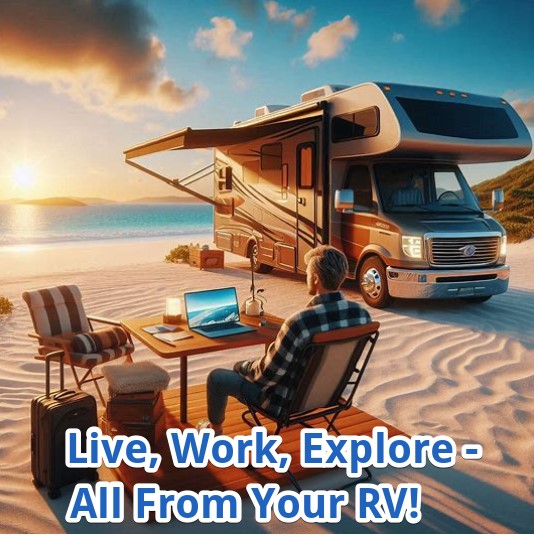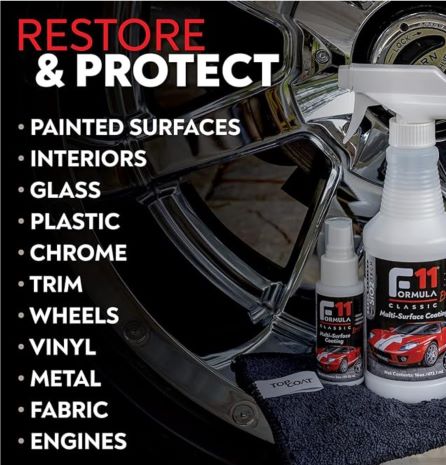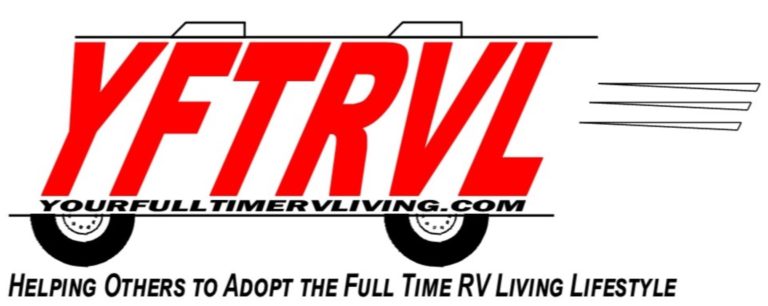One thing is for sure when purchasing an RV; you need to do your homework! If you are unsure of what you are getting yourself into, please seek the assistance of a professional!
What I would like to share in this post is a few stories about RV buyers that have been saved from purchasing a money pit because they took the time to slow down the sales process and seek some help in evaluating the RV they were interested in purchasing.
Most people who purchase an RV start out an RV show or at a dealership. This is mainly because there is a large selection of RV’s available to look at. This is a good place to start an RV search for either a new or used RV. But you have to know what you want in an RV, or you may get a good salesperson who will get you excited about something that may not be what you want.
I am an advocate of purchasing a used RV over a new one for two reasons. First, let someone else take the hit for the first two years of depreciation!
The second is, if you buy an RV that is two years old or older, you will save yourself the headaches that come from the issues that commonly need to be repaired because of factory mistakes. Our friends who have purchased new RV’s have had issues up to two years after their purchase.
You can even find a good used RV that can be ten years old or older!
The thing to keep in mind when purchasing these used units is to realize that there is a great need to have a professional review the overall condition of the RV. Then all the RV’s essential systems can be evaluated for proper function. I have discussed a list of recommended items to be checked in another post on this website.
RV Horror Stories
As an RV inspector, I have seen some very unusual situations that have come up during the inspection process! Because my clients had the foresight to seek out the counsel of someone more knowledgeable about RV’s, they were able to avoid buying a money pit!
The internet has become a very popular way for people to find an RV! They can be found nearby or in another state. We have clients who contact us and ask us to inspect the RV prior to them making a trip to see it themselves. This can save them lots of time and money because the RV they see online is not always in the same condition when viewed in person.
Whether the RV is at a dealership or it is a private sale, the photos shown online never tell the whole story. We saw this recently for a private seller.
The potential new owner found the RV online and contacted to have an inspection done on the RV. Most of the RV systems were in working order, but what was not obvious to the untrained eye was an area of water intrusion that was hiding behind some cabinets. It all stemmed from a roof penetration that could have been easily missed if not for the inspection process!
These are the kinds of issues that will lead to damage to the RV and repairs will cost in the thousands of dollars to repair! Would it not be better to know this before the sale as opposed to after?
Another client was interested in a class A diesel motorhome that was the make and manufacturer that he preferred. He did his research, found it out if state and through an online source. It had the chassis and engine type he wanted, according to the manufacturer specs. He made the wise move to order a third-party unbiased inspection of the RV. He also ordered fluid analysis to be performed on the motorized components of the RV.
The inspection was done as ordered and in addition to the RV being completely modified from the roof to the interior, the Cummins engine that he wanted turned out to be a Caterpillar! Had he known that ahead of time he would have never even considered the RV! But, he was delighted with the outcome of the inspection because from all that was uncovered it saved him tens of thousands of dollars in not buying a mistake!
Another client found a two-year-old unit that was parked in Florida in an RV garage home. Again, it was only two years old and apparently garaged its entire life, other than when traveled in. The potential buyer ordered premier level inspection on the unit including fluid analysis on the engine, transmission, and the generator.
The seller was not pleased that an inspection was being performed on his pristine unit, even though he wanted to get it sold. He questioned about why is the buyer inspecting this beautiful unit! There was nothing wrong with it, according to the seller!
On the day of the inspection, a leak was noted underneath in the bin area under the kitchen. It was dark in the garage, so the unit was moved out into the driveway where more light was available to check the chassis and undercarriage visually.
Now, the onboard water pump was left on during this moving process. Once the RV was started up and pulled out into the driveway, water started gushing out of the storage bay under the kitchen. It was quickly observed and the water pump was shut off!
Now, what if the inspection was never ordered and the RV was purchased and somewhere down the road, during a trip, that happened?
The client was still interested in purchasing this particular RV but only after the leak between the interior flooring and the storage bays was fixed! The estimated cost of the repairs was in the thousands of dollars due to the tile flooring in the RV.
These are just a few of the kinds of things we see when RV buyers order a pre-purchase inspection.
Are you looking to purchase a used RV? Do you want me to help you so that you don’t wind up buying a money pit, or even worse, an RV that you did not want?
You can contact us, and we will coach you through the process!
If you would like to tackle a full-blown RV inspection on your own, check out my discussion at this link. If you are a do-it-yourself kind of person, you may have the skills to save time and money by following my advice! I have trained over 1,300 people to be RV inspectors since 2010.
Best wishes as you look for your home on wheels!









6 comments
Skip to comment form
Good day sir, I stumbled across this site while looking for info/ consumer reports on a particular RV brand and wished I’d known of this service prior.
I did send a request for a sample report and am not only interested in the inspection process/service, but also in possibly becoming a part-time inspector. Thank you for all the info you have provided. One question I have; what is the normal / general cost of an inspection?
Thank you for your time and consideration this issue.
SFC Dennis R Strope USA, RET
Author
Greetings Dennis!
Thanks for stopping by our website!
I will send you a sample report directly to your email address as well as information on what it takes to become an RV inspector.
As far as costs for RV inspections, it depends on the individual inspector, the level of inspection you choose and the type of RV being inspected. It is fair to say that a basic inspection starts at $300. Inspectors spend 3 to 8 hours with the RV. It is the equivalent of a home inspection, but for an RV. It’s a home inspection on steroids.
I certainly wish I’d found this before my purchase of a 2004 Keystone Challenger. Everything looked well cared for. I was told no leaks multiple times. There was an area inside on the ceiling where a branch had hit the roof. I was told that they had repaired the roof and resealed the entire roof. That was not true. Began experiencing leaks from an antenna over the bed.
But then found a soft spot on the floor. When we opened the floor it was obvious that a patch job had been attempted, unless the manufacturers normally put roofing shingles inside the floor. I paid a lot for this camper for my mother to stay in because she wasn’t able to handle all the stairs. Now I am looking at costly repairs that I can’t afford and if I can’t fix it, where will my mom go? Then I keep reading online that I just need to suck it up.
Author
Hi Nora!
Thanks for stopping by our website!
We are sorry to hear you are having so many problems with your RV! Water intrusion is something that I focus on heavily when training RV inspectors to do more advanced level investigations for clients looking to purchase an RV. It does not seem to matter whether new or used. We see the same issues.
Had you found us we might have been able to alert you to possible problems that could have been investigated before you purchased the RV. That is why we are working so hard to be sure RV inspectors are available to assist RV buyers nationwide.
At this point, the best thing you can do is to stop the leaking from the roof and work to dry out the RV so you don’t develop mold issues. I don’t know if you are a do-it-yourselfer, but there are videos online that can help you to learn how to repair sealant on rubber roofs. As far as the flooring, there are also online videos for these repairs too. If you are up to it, this may be the solution. Otherwise, an RV technician could get expensive.
Best of luck!!
Help! I just bought an A-Frame camper from an RV dealer who installed a new class II hitch on my Volvo XC 70 stationwagon, which can tow 3500 lbs, and the hitch is rated for 3500 lbs. But, as I drove out of the lot w/ the new camper hitched to the car, I commented that the car was too low to the ground now in the back, and was told that is due to towing more weight than I am used to towing w/ just a utility trailer, that I was used to towing. I’ve never owned a camper before. Will this damage my car, it’s about 3-4″ lower in the rear with the new camper hitched to it? Not sure what to do at this point. Does anyone have any suggestions? Also, w/ the new brake light cord, the tailgate door on the car won’ tshut tight enough for the” tailgate light on” to go out.
Author
Hi, Tracy!
The vehicle may be able to tow 3,500 lbs, but what is the actual weight that can be placed on the hitch, also known as pin weight? Check your vehicle manual and also the RV manufacturers specs to see if you can determine these values. If you are overloaded you will be placing yourself in a very unsafe situation.